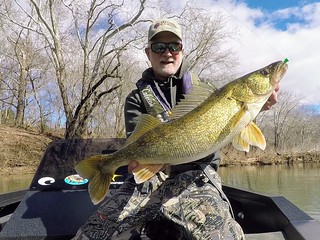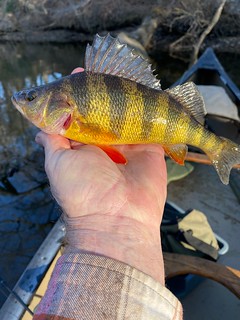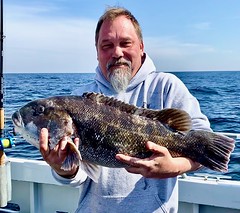Maryland Fishing Report – March 16
Despite winter’s heavy hand last weekend, the harbingers of spring are all around us. The geese, swans, and most migratory ducks have headed north and are replaced by the arrival of the ospreys. Crocus and daffodils are blooming, and fishing opportunities abound. Anglers are enjoying the trout management waters that are open, all species of fish are awakening from their winter’s sleep, and spawning runs of yellow and white perch are underway.
Forecast Summary: March 16 – 22
As spring officially arrives this Sunday, the signs of the season will continue increasing with a warm week ahead. With these longer and warmer days, Chesapeake Bay waters will continue to slowly heat up for game fish. Bay surface water temperatures have risen to the mid 40. Smaller streams and downwind areas on a sunny day will warm faster and will often hold water temperatures in the upper 40s – these waters in low salinity areas are where to look for spawning yellow perch as they move up from their wintering areas in the downstream portion of rivers.
Expect average flows for most Maryland rivers and streams. Bay salinities are about normal. Expect average clarity for most Maryland portions of the Bay and rivers except the Gunpowder River and Susquehanna Flats. To see the latest water clarity conditions, check Eyes on the Bay Satellite Maps.
There will be above average tidal currents all week as a result of the upcoming full moon on March 19.
For more detailed and up-to-date fishing conditions in your area of the bay, be sure to check out Eyes on the Bay’s Click Before You Cast.
The yellow perch spawning runs are a much-anticipated yearly event for early March, and so far this year has been enigmatic. Windy and cold weather recently did much to lower water temperatures in the spawning reaches. Before last Saturday’s snow, a number of spawning rivers on the western side of the Bay performed well, with acceptable water temperatures and good spawning runs of yellow perch. The water temperatures in the spawning reaches on the eastern side of the Bay tended to run colder.
On many days the past two weeks it has been too windy to safely fish the lower Susquehanna River from a small boat, but anglers are finding more sheltered conditions in the North East River. Excellent shoreline fishing opportunities are found at North East Community Park. Anglers at Grays Run at the Route 40 crossing and the upper Chester River at Millington are also reporting good fishing for yellow perch.
Small minnows tend to be the most popular bait for yellow perch, and can be fished on a simple bottom rig or lip hooked on a small shad dart. When fishing with hooks, a #4 is preferred to help deter deep-hooking on the smaller yellow perch that need to be returned to the water. Small soft plastic jigs, beetle spins, and spinners can also work well if underwater snags are minimal.
White perch will arrive in earnest this week or next, and some are already being caught by those fishing below the spawning reaches. Minnows, pieces of bloodworm, or grass shrimp are good baits when fishing with a bottom rig. Casting and working shad darts or small jigs tipped with pieces of minnow or a grass shrimp also work well for white perch.
Blue catfish are providing plenty of fishing opportunities in the lower Susquehanna River and surrounding waters. They along with channel catfish can be caught on fresh cut baits of white perch, gizzard shad, menhaden, nightcrawlers, or prepared baits. Many anglers are concocting their own bait formulas such as soaking nightcrawlers in garlic.
The major focus in the middle Bay is pursuing white and yellow perch in the upper reaches of the tidal rivers, along with fishing for blue and channel catfish. Severe water temperature fluctuations have definitely made predicting the yellow perch spawn in the Eastern Shore rivers very difficult. Yellow perch experts believe the fish may have spawned below their traditional spawning areas due to cold water surges.
It is still worth the effort to keep trying for yellow perch, especially if post-spawn yellow perch can be targeted. White perch are on the move up the tidal rivers and can be found in the upper river sections. A flood tide is the best time to fish lately since the waters in the deeper portions of the upper river areas are warmer. The skinnier waters far up the rivers tend to be more affected by recent cold runoff. The waters of the Tuckahoe and Choptank have been very cloudy with almost zero visibility in the water. This could be from all of the strong winds we’ve experienced. This lack of visibility may have a lot to do with the generally poor perch fishing lately.
The Choptank River is a favored water for anglers chasing the yellow and white perch runs and there are reports of perch being found from below Denton to Red Bridges on the Choptank, and from the mouth of the Tuckahoe to Hillsboro. There is pleasant weather predicted for the rest of the week, so fishing should improve with warmer water temperatures.
Striped bass are moving into the Choptank River – large females have been spotted in the lower sections of the river and smaller males are being seen up to the Denton area. Anglers are warned that targeting striped bass in the spawning rivers is strictly illegal, and fines and license suspensions can result. If the fish you find on your depth finder turn out to be striped bass, move to a new location. Maps indicating when areas of the Bay are open and closed to striped bass fishing can be found on the DNR website.
Fishing for a mix of blue and channel catfish is good in many of the tidal rivers. Fresh cut bait tends to be a favorite bait. Fishing with large J style hooks is often standard fare, but many are learning to use circle hooks with a sliding egg sinker or fish finder rig. Using a circle hook gives you more time to attend to a catfish bite and if you are using a bait runner reel, or you can leave the drag loose on other reels and the catfish will hook itself in the corner of the mouth as it swims away.
The Choptank River is quickly becoming overpopulated with blue catfish. There is a very large number of 8-inch to 12-inch blue catfish in the river and they will grow to large sizes if not removed. Anglers are urged to remove any blue cats they catch regardless of size. Blue catfish are known for their ravenous appetites at any size and this growing population can cause a significant risk to other species, including striped bass recruitment.

Henry Bouchat caught this blue catfish while fishing on the Chicamacomico River on the Eastern Shore. Photo courtesy of Henry Bouchat
Most activities in the lower Bay center on fishing the tidal rivers for yellow perch, white perch, and blue catfish. The upper reaches and adjoining creeks of the Nanticoke and Wicomico rivers on the eastern side of the Bay are providing fishing for yellow perch, either pre-spawn or post-spawn. White perch are beginning to fill in these same areas as they move up the rivers and creeks.
Minnows fished close to the bottom are perhaps one of the best ways to target yellow perch. Casting a small shad dart with a lip-hooked minnow is another good way to fish if the snags are not too prevalent. When fishing for white perch, it often pays to look for holes in the deeper rivers and creeks and cast shad darts tipped with a piece of minnow or a grass shrimp across current, walking the shad dart or small jig along the bottom with slight twitches. Once you find an area where white perch are bunching up, they are suckers for this presentation.
The creeks and tributaries that flow into the Potomac River – such as Allen’s Fresh off the Wicomico, Mattawoman Creek, and upper Piscataway Creek – are often good places to fish for yellow perch and white perch. The Patuxent River at the Route 4 crossing area is another popular location to fish for yellow perch and white perch.
Blue catfish in the Potomac River south of the Wilson Bridge are providing excellent fishing for eating-size fish and lunkers up to 60 pounds or more. A few lunker- sized blue cats caught recently in a blue catfish tournament looked more like blimps than fish. Blue catfish under 20 pounds make the best eating. Fresh-cut baits of gizzard shad, white perch, menhaden, or prepared baits all work well. Shore-based angles can fish at Fort Washington Park and other accessible shoreline spots.
The Patuxent River is also full of blue catfish and some of the best fishing this week can be found at the Route 231 Bridge, upriver to the Jug Bay area. On the Nanticoke River, the section of the river near Sharptown is hard to beat as is the mouth of the Marshyhope up to Federalsburg.

John Mullican shows off a magnificent walleye before releasing it back into the upper Potomac waters. Photo courtesy of John Mullican
Freshwater fishing opportunities are improving with warm weather and longer daylight hours increasing water temperatures. Largemouth bass are shaking off the winter cold, along with a variety of fish such as crappie. Then there are those fish such as walleye and smallmouth bass, which actually are more active in March’s colder water temperatures in Deep Creek Lake and the upper Potomac.
The trout stocking crews have been busy in the 0 and 2 Closure trout management waters, so there are trout fishing opportunities during the Closure 1 period. Closure 2 waters will close to all fishing on March 20 at 10 p.m., and Closure 1 waters have been closed since March 6. All Closure 1 and 2 waters will be open to trout fishing at 5:30 a.m. on March 26. Be sure to check the trout stocking website for all of the latest stockings and maps.
Anglers in both tidal and nontidal waters continue to enjoy good fishing for chain pickerel. The pickerel can be found holding near structure such as sunken wood. They are rather plump right now as the females are full of eggs and getting ready to spawn, so take care when removing hooks and releasing them.
Fishing for a mix of smallmouth bass and walleye is very good on the upper Potomac River. Anglers are using a mix of jigs, small crankbaits, and live minnows. Fishing for walleye and smallmouth bass is also good at Deep Creek Lake along with a bonus of yellow perch and northern pike.
Largemouth bass fishing is quickly improving as the bass become more active with warmer water temperatures, these early spring months offer some of the best fishing opportunities for largemouth bass as they feed aggressively. Transition areas between the deeper waters and the shallows are excellent places to target with a mix of jerkbaits, crankbaits, and spinnerbaits. Sunken wood, fallen treetops, and dock piers are good places to work wacky rigged soft plastics or Senko type plastics.
Crappie are schooled up deep near most any kind of structure at this time, bridge piers, fallen treetops and sunken brush. Small marabou jigs or minnows under a slip bobber are great ways to fish for them. The spoils area on the northeast side of the Wilson Bridge and the Fort Washington Marina docks on the tidal Potomac are excellent places to fish for them. The small ponds that dot the Maryland landscape often hold crappie and provide good fishing. Wye Mills Lake on the Eastern Shore is a prime example.
The charter and party boats that are heading out to the offshore wreck and reef sites are providing their anglers with some exciting tautog fishing opportunities. The windy weather for the past two weekends is now behind us and the boats and anglers are enjoying calmer seas and some excellent fishing.
“May Easter find us at the trysting-place, there where the dancing bubbles spin and race, to meet the first March Brown!” – Patrick R. Chalmers
Maryland Fishing Report is written and compiled by Keith Lockwood, fisheries biologist with the Maryland Department of Natural Resources.
Click Before You Cast is written by Tidewater Ecosystem Assessment Director Tom Parham.
This report is now available on your Amazon Echo device — just ask Alexa to “open Maryland Fishing Report.”



